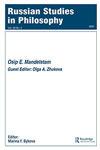关于折叠和展开的简单论述
IF 0.1
4区 哲学
Q4 Arts and Humanities
引用次数: 1
摘要
摘要库萨的尼古拉提出了一个令人困惑的问题:被折叠和被展开的事物为什么以及如何平等于自身和彼此(重合对立),在展开的过程中不给自身增加任何东西,在展开时不失去任何东西?到目前为止,这个问题还没有得到回答,因为欧洲的哲学、科学和思想总体上遵循了一种不同的线性范式,即从第一原理推导知识。这种范式的问题在于,第一性总是一种提出的、因此是任意的知识,不是由基于第一性原则的一系列论点推导和证明的。这并不违反科学理性,尽管它确实与哲学为任何第一原则的最终明确性和正当性所做的努力相矛盾。至于被折叠展开的范式,它确实符合对最终正当性的哲学追求,因为它避免引入任何武断的东西。这一范式是根据俄罗斯思想的tselostnost(完整性、整体性)和svyaznost(联系性、凝聚力)类别进行阐述的,为在哲学、人文科学和科学中应用展开的范式提供了合理的基础。它为研究人类思维作为一种感知活动开辟了一个新的视角,而不是将其简化为大脑和身体的神经过程。本文章由计算机程序翻译,如有差异,请以英文原文为准。
A Simpleminded Discourse on Enfolding and Unfolding
ABSTRACT The paradigm of enfolded-unfolded (complicatio-explicatio) introduced by Nicolas of Cusa, poses a puzzling question: why and how are the enfolded and unfolded equal to itself and to each other (coincidentia oppositorum), adding nothing to itself while unfolding, and losing nothing while enfolding? That question had not been answered so far, since European philosophy, science, and thought in general followed a different, linear paradigm of deducing knowledge from first principles. The problem with that paradigm is that the First is always a posed, and therefore arbitrary, piece of knowledge not deduced and not justified by a chain of argument resting on that First principle. This does not violate scientific rationality, though it does contradict philosophy’s strive for final clarity and justification of any of the first principles. As for the enfolded-unfolded paradigm, it does comply with that philosophical quest for the final justification, since it avoids introducing anything arbitrary. This paradigm is elaborated along the lines of the tselostnost’ (integrity, entirety) and svyaznost’ (linkedness, cohesion) categories of Russian thought to provide a rational ground for applying the enfolded-unfolded paradigm in philosophy, the humanities, and the sciences. It opens up a new perspective for studying the human mind as a sense-positing activity without reducing it to brain-and-body neuroprocesses.
求助全文
通过发布文献求助,成功后即可免费获取论文全文。
去求助
来源期刊

RUSSIAN STUDIES IN PHILOSOPHY
PHILOSOPHY-
CiteScore
0.10
自引率
0.00%
发文量
14
期刊介绍:
Russian Studies in Philosophy publishes thematic issues featuring selected scholarly papers from conferences and joint research projects as well as from the leading Russian-language journals in philosophy. Thematic coverage ranges over significant theoretical topics as well as topics in the history of philosophy, both European and Russian, including issues focused on institutions, schools, and figures such as Bakhtin, Fedorov, Leontev, Losev, Rozanov, Solovev, and Zinovev.
 求助内容:
求助内容: 应助结果提醒方式:
应助结果提醒方式:


